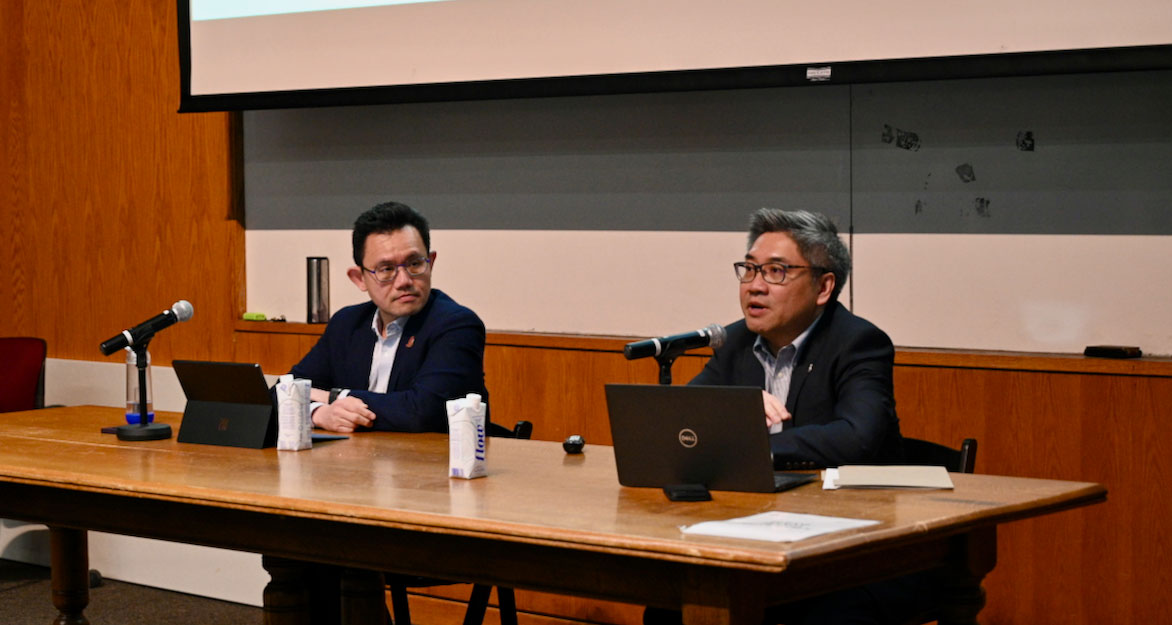2024-25 Budget Supports Teaching, Learning and Student Success

Victoria Univeristy's Ken Chan (left), bursar and CAO, and Anthony Yeung, associate CAO, say they anticipate that the 2023-24 fiscal year will end with a surplus primarily due to increased revenue. (Photo by Joe Howell)
The Board of Regents has approved a 2024-25 budget for Victoria University that includes new investments to support teaching, learning and student success. Separately, $3.7 million will be withdrawn from the endowment to fund a 16 per cent increase in scholarships, bursaries and awards.
“Despite current economic conditions and other financial challenges facing universities, this is a measured and prudent budget with a moderate operating deficit,” says Ken Chan, bursar and chief administrative officer.
“By diligently balancing our financial priorities, we are not only ensuring long-term stability but also investing strategically in the operations and infrastructure that underpin our academic mission, ensuring a vibrant and thriving educational environment."
The budget approved by the Board on April 18 calls for $55 million in spending, up from $49 million in 2023-24, and forecasts a $460,000 deficit, Chan said at a Town Hall on Wednesday.
This was Chan’s first budget presentation open to all staff, faculty and librarians, and he said he planned to make it an annual event in the spirit of employee engagement and transparency. “I am grateful for the hard work and efforts of our colleagues across the university during the budget planning process,” he said.
Chan and associate CAO Anthony Yeung say they expect the 2023-24 fiscal year to end with a surplus driven largely by higher revenue from:
- Summer residence beds being occupied for 23,000 nights, more than the 16,000 forecasted
- A 98.7 per cent student residency bed occupancy rate during the academic year, up from 97 per cent projected in the budget
- Greater investment income due to higher interest rates
The single biggest revenue source for the University continues to be real estate rents from university lands on Bloor, Charles and St. Thomas Streets. At $12 million, that accounts for 23 per cent of revenues, or nearly one-quarter.
Together, student residence fees ($9.3 million or 18 per cent) and student meal plans ($5.1 million or 10 per cent) account for 28 per cent.
Operating grants, which Victoria receives from the University of Toronto, are another significant source of revenue. Victoria College students pay tuition directly to U of T, which in turn provides an operating grant to Victoria University to help fund academic programs and related administrative, library, occupancy and capital deferred maintenance costs. Negotiations with U of T for renewed operating funding are ongoing. Victoria University continues to make up for the shortfall required to deliver its academic programs through other revenue sources.
The annual withdrawal from the endowment to support academic programs and campus operations represents 10 per cent of revenue. This coming year it will be $5.2 million. An additional $3.7 million from the endowment fund will be earmarked for scholarships, bursaries and awards, a 16 per cent increase over the last year.
On the spending side, the single biggest investment is in people – faculty, librarians and staff. More than half–55 per cent–of spending is for wages and salaries. This budget reflects higher salaries and wages following the repeal of Bill 124, which capped increases for public sector employees at 1 per cent. The budget includes new funding for teaching and learning resources such as the Victoria College Writing Centre and new academic advisers to help students succeed.
“Our 2024-25 budget prioritizes Vic's longstanding focus on teaching, learning, and student success,” says President Rhonda McEwen. “Through our enhanced investments to deliver on our academic programs, we are fostering a generation of thinkers, innovators and leaders who will shape our world for the better.”
Another focus of the budget is Building the Future of Vic U, $6 million pegged for the revitalization of our historic and beautiful campus to better serve students, propel our academic mission and provide an inspiring sense of place for our community.
